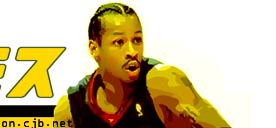





| Judge throws out most of Iverson case |
|---|
|
After his defense team eviscerated the key witnesses against him, Allen Iverson emerged from a criminal courtroom today facing only two minor charges. A Municipal Court judge decided today that the 76ers superstar probably did not have a gun during an angry search for his wife, and threw out virtually all criminal charges against him and his uncle. After blistering cross-examination by famed defense attorney Richard A. Sprague - in which one prosecution witness admitted he did not see Iverson carrying a handgun, and another said he had called 911 moments after consulting with a personal-injury lawyer - Judge James M. DeLeon severely curtailed the prosecution's case. DeLeon ruled that prosecutors could only proceed to trial on two misdemeanor counts of terroristic threats each against Iverson, 27, and his uncle, Gregory Iverson, 39. He dismissed felony weapons, trespass and conspiracy charges. Tawanna Iverson, the athlete's wife and the subject of his search, did not attend the hearing. Iverson and his uncle were accused of barging into a West Philadelphia apartment on July 3 and threatening the two men inside. Charles Jones, 21, and Hakim Carey, 18, initially told police that the athlete showed them a black semiautomatic weapon tucked in his waistband. But today, as the first witness inside the packed courtroom, Carey immediately sent the case into turmoil by backing away from the gun charge and his prior statements to police. "Allen squatted and flipped up his shirt, and I had saw something black - like a black handle - but I did not jump to conclusions, because I was not sure what it was," Carey said. He said he told police he saw a gun because Jones wanted him to. "I don't know if he actually had a gun," Carey said. "Jones said he had a gun, so I just went along with it." Under cross-examination, Carey said the object beneath Allen Iverson's shirt could have been the athlete's black two-way pager. The weapons charge was one of four felonies Allen Iverson faced. His cousin Shaun T. Bowman provided critical testimony crippling the gun accusation and knocking out the felony trespassing charges, hinting that Jones was after a payout. Bowman testified that two days after the incident, Jones told him there was no gun. "He said - almost verbatim - that if my cousin had gave him $100,000, [he] would have dropped all the charges, " Bowman testified. Bowman also said that Iverson paid the rent for the 6235 Chestnut St. apartment and had permission to enter at any time, eliminating the trespass charge. In an interview after the hearing, DeLeon indicated that Bowman's testimony was central to his decision to toss out the felony weapons, trespass, and accompanying felony conspiracy charges. "I reached a decision that it was not probable that he had a gun," DeLeon said. Although Jones did not waiver from his statements, DeLeon said he was swayed by Carey and Bowman's contradictory testimony. "It sounded like you had a relative, looking for a relative, at the house of a relative. And you had the door opened by the guest of a guest," DeLeon said. "The $100,000 did not come into play, because it was hearsay," DeLeon added. But from the witness stand during cross-examination, Jones admitted that on July 3 he spoke at length to a personal-injury lawyer. Eighteen seconds later, according to cell-phone records obtained by the defense, Jones called 911. By that time, it was more than 10 hours after the alleged incident, but it was the first complaint to police. "The moment you got off this 21-minute call to your lawyer . . . . Wham!" Sprague said. Charles Ehrlich, chief of the District Attorney's Municipal Court unit, said prosecutors would weigh refiling the dismissed felony charges to the higher Common Pleas Court. "We believe that the evidence was sufficient to hold the case for court," Ehrlich said after the hearing. ". . . The case should have been held for trial." Police Lt. Michael Chitwood, one of the key investigators, said: "We did everything humanly possible." "Every day in this building, witnesses go south," Chitwood said outside the courthouse. Inside the courtroom, Ehrlich told the judge that Allen Iverson had no special privilege allowing him to push his way into an apartment and threaten the people staying there. "All of these people are trying to backslide and change what happened," Ehrlich told the judge. "Allen Iverson was angry. He was determined, one way or another, to find his wife. . . . But he doesn't have a right to do this, no matter who he is." Ehrlich pointed to testimony that was not contradicted or challenged in the courtroom. Both Carey and Jones testified that Allen Iverson made and received calls at the apartment. Before he left, they testified, he used his shirt to wipe off Carey's cell phone and the apartment phone. "If you have permission to enter the apartment, and you're not doing anything wrong, and you're not brandishing a gun . . . then you don't wipe off the phone before you leave!" Ehrlich told the judge. "It indicates a clear consciousness of guilt. . . . He was trying to get rid of the evidence!" Outside the courthouse, DeLeon was not sure what to make of that testimony. "I don't know what goes through these guys' minds," DeLeon said, adding that wiping off a phone is not a crime. Throughout the six-hour hearing, Sprague aggressively contested Ehrlich's every move, and called portions of testimony "nonsense" and "double-talk." "This man has been crucified on this business," Sprague said during one lengthy objection. "They're trying to railroad somebody!" Sprague also caught Jones by surprise with the cell-phone records, which detailed Jones' many calls and his discussion with a lawyer in the hours before he called police. "I call for this court to give a ringing - a ringing - dismissal of these charges," Sprague told the judge at the end of testimony. Guy R. Sciolla, Gregory Iverson's attorney, praised DeLeon's ruling. "I think it's appropriate. I think what the judge did is the absolute right decision," Sciolla said. "The only reason he got arrested was because of his celebrity." Sciolla said his client was relieved after the ruling. Allen Iverson, Sprague, and about two dozen relatives and supporters quickly left the courthouse by a side exit, avoiding the throng of local and national media. This evening, the basketball team said in a statement: "We continue to support Allen, and we look forward to the resolution of the remaining issue in this matter so that both Allen and the 76ers can return their full focus where it properly belongs: on the basketball court." If Allen Iverson and his uncle are each convicted of two counts of terroristic threats, they face a maximum 10 years in prison - a sentence considered unlikely. On Thursday, during a status hearing the Iversons will not attend, the court is expected to set a trial date for the remaining misdemeanor charges. Both Carey and Jones testified that in Iverson's search for his wife, the athlete told Jones to leave a telephone message for her. "Allen had said: 'Tell my wife I'm waving a gun in your face and beating on you,' before I actually do it," Carey testified. Carey - who said he first answered Allen Iverson's knock on the door with a pencil and paper, hoping to get an autograph - said he is now paranoid about the case, and just wants it to be over. "Allen Iverson is known through the city. Anybody can come up to me and do anything," he said. "I don't want to be Philadelphia's most wanted". |

|
|---|
| Author |
| Jacqueline Soteropoulos |
| Source |
| Inquirer |
| Return to Articles |